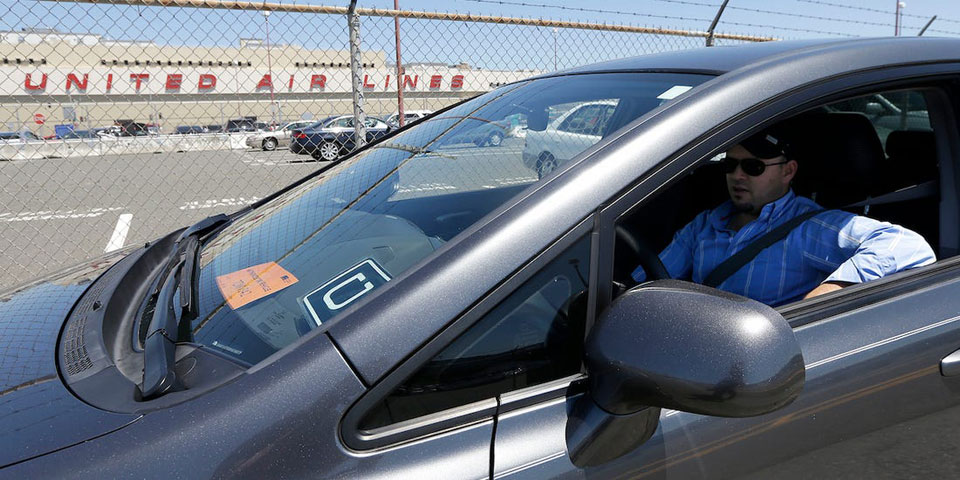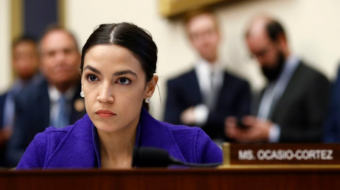
WASHINGTON—In another deregulatory bonanza for the corporate class, the GOP Trump regime’s Labor Department wants to let firms reclassify more workers as “independent contractors,” depriving them of the right to a minimum wage, overtime pay, and the right to unionize.
And buried deep within DOL’s Notice of Proposed Rulemaking, published Sept. 25 and with a one-month deadline for comments, is a table that shows business would reap some $400 million more per year should the scheme go through.
The Trump DOL proposal drew an angry response from the National Employment Law Project, and a letter from the House Education and Labor Committee’s ruling Democrats demanding background data and advocating a delay.
NELP Executive Director Rebecca Dixon said Trump’s DOL would let employers create “sweatshop conditions” and would hurt disproportionately hurt workers of color, thus perpetuating economic racism.
The Dems protest the short deadline since the usual comment period for a proposed federal rule is two months. And once adopted such rules are almost literally set in stone, and harder to toss out than laws.
They also demand DOL turn over all correspondence it had with private interests i.e. big business, and Trump’s Office of Management and Budget about the issue.
DOL says it wants to toss out confusing interpretations, from prior revisions and court rulings, about who is an “independent contractor” and who isn’t, and replace them with a simple test: Who controls a worker’s conditions, the worker or the boss.
It would “adopt an ‘economic reality’ test to determine a worker’s status as an employee or an independent contractor. The test considers whether a worker is in business for himself or herself (independent contractor) or is economically dependent on a putative employer for work (employee),” under the Fair Labor Standards Act, the nation’s basic minimum wage and overtime pay law.
Deciding whether a worker is an independent contractor would depend on “two ‘core factors,’ specifically the nature and degree of the worker’s control over the work and the worker’s opportunity for profit or loss based on initiative and/or investment. These factors help determine if a worker is economically dependent on someone else’s business or is in business for himself or herself,” DOL’s Wage and Hour Division said.
DOL admits workers reclassified from being “employees” under the Fair Labor Standards Act to being “independent contractors” would have to shoulder more expenses and receive fewer benefits.
But DOL didn’t quantify those losses, one of which is coverage by unemployment insurance, a key point for the millions of jobless workers in the current coronavirus pandemic.
And DOL’S proposed rule is completely silent about the fact that making a worker an “independent contractor” under labor law, rather than an “employee,” deprives the worker of the right to organize and collectively bargain.
In short, DOL leaves the workers at the complete mercy of bosses, NELP’s Dixon says. DOL says its proposal is part of the Trump deregulatory agenda, which has benefited firms.
If DOL’s rule goes through, millions of more workers, such as drivers for taxi-like companies—think Uber and Lyft—port truckers, adjunct professors, and even fast-food workers, would be left without worker rights or even the right to a minimum wage and overtime.
DOL calculated the current number of independent contractors at between 10.6 million and 18.9 million, but admits that’s based on 2019 data, before the coronavirus pandemic and the resulting economic depression and high joblessness.
It also claims that while “independent contractors” would have to shoulder more taxes and receive fewer benefits, they’d reap $78 million yearly by being able to work when they want. But it didn’t offer any evidence for that gain. It also didn’t quantify how much they’d lose.
“The DOL’s anti-worker proposal dramatically and improperly narrows coverage of workers under the Fair Labor Standards Act,” the nation’s basic wage and hour law, covering minimum wages and overtime pay, Dixon said.
“This proposal would give employers and corporations far more leeway in classifying workers as independent contractors, thereby allowing them to pay subminimum wages, hire child labor, and avoid overtime pay. This is yet another example of the Trump administration’s relentless push to stack the deck against workers at every turn.”
“Companies must be accountable for how they treat workers—no matter what the company calls the workers or how it classifies them. Companies that require their workers who are not running their own businesses to operate as ‘independent contractors’ in order to get a job should not get a free pass on illegally misclassifying workers, but the DOL has just offered them one.”
“This action hurts the very workers who have been organizing on the frontlines for better wages and more protections, including construction laborers, janitors, home care workers, and those called ‘essential workers’ during the COVID-19 pandemic, who clean homes, care for children and elderly individuals, and deliver groceries. These workers must not be left to earn subminimum wages and work more than 40 hours per week without getting any overtime pay.”












Comments